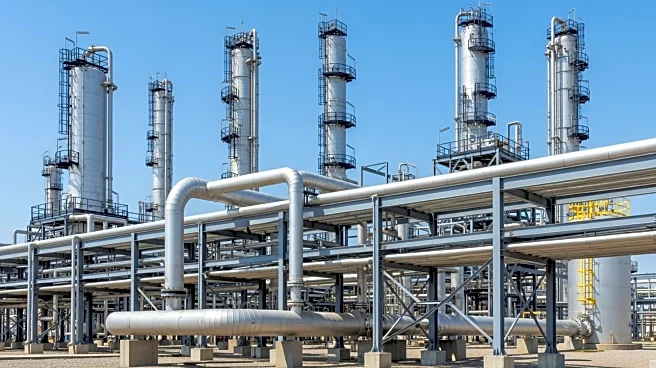What's Happening?
Iraq is on the verge of achieving complete self-sufficiency in gasoline production with the upcoming inauguration of the Fluid Catalytic Cracking (FCC) project at the Basra refinery. Announced by Iraq's
Minister of Oil, Hayan Abdul Ghani, the project is valued at $3.75 billion and is financed through a concessional loan from Japan. The FCC project is set to transform Iraq into an exporter of refined oil products by converting heavy fuel oil into high-value products such as high-octane gasoline, diesel, and liquefied gas. The project is expected to produce 4,200 cubic meters of gasoline, 2,000 cubic meters of diesel, and 750 tons of liquefied gas daily. This development marks a significant milestone for Iraq, reducing its reliance on gasoline imports, which previously cost the country $5 billion annually.
Why It's Important?
The completion of the FCC project is crucial for Iraq's economic independence and energy security. By achieving self-sufficiency in gasoline production, Iraq can significantly reduce its import costs, freeing up financial resources for other developmental projects. Additionally, becoming a net exporter of refined petroleum products will enhance Iraq's position in the global energy market, potentially increasing its revenue streams and strengthening its economy. This shift could also lead to more stable fuel prices domestically, benefiting consumers and businesses alike. The strategic importance of this project aligns with the government's focus on boosting the country's refining capabilities and economic resilience.
What's Next?
The imminent inauguration of the FCC project by Prime Minister Mohammed Shia Al-Sudani is expected to solidify Iraq's transition into a self-sufficient and exporting nation in the petroleum sector. As the project becomes operational, Iraq will likely explore further opportunities to expand its refining capacity and export markets. The government may also focus on enhancing infrastructure and logistics to support increased production and export activities. Stakeholders, including international investors and energy companies, may show increased interest in Iraq's evolving energy landscape, potentially leading to new partnerships and investments.
Beyond the Headlines
The FCC project's success could have broader implications for Iraq's geopolitical standing, as energy independence often translates into greater political leverage. Additionally, the environmental impact of increased refining activities will need to be managed carefully to ensure sustainable development. The project also highlights the importance of international cooperation, as evidenced by Japan's financial support, which could pave the way for future collaborations in other sectors.









